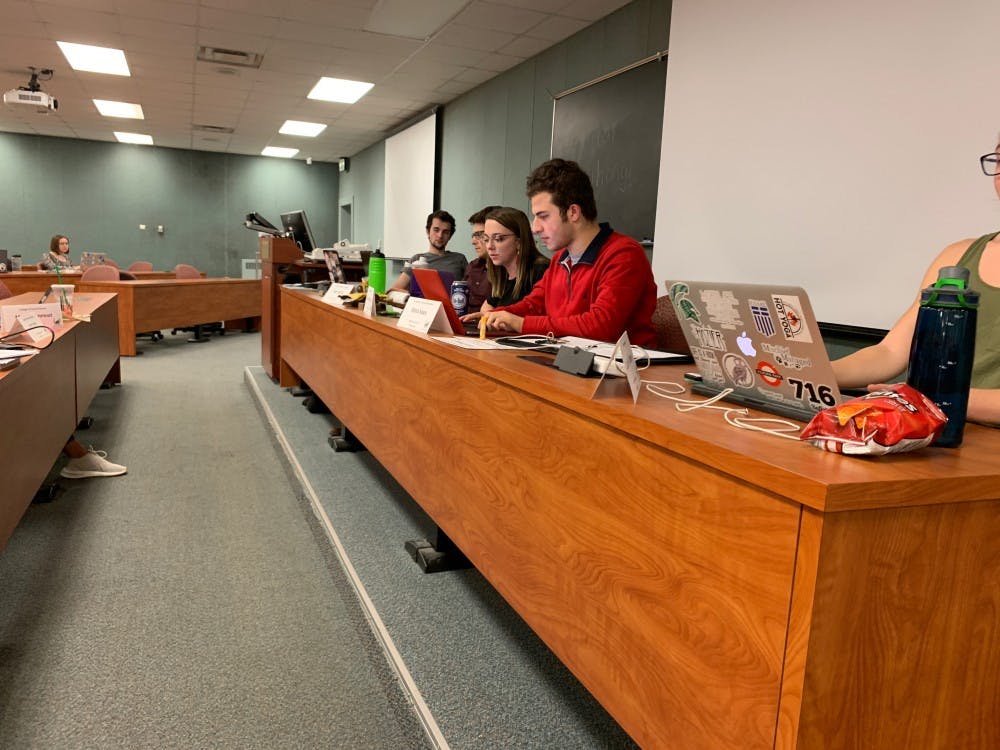The presidential veto — a power that has only been used twice before — was used by President Pro Tempore of the Associated Students of Michigan State University, or ASMSU, Dan Iancio on two bills that were recently passed.
This came after the final General Assembly meeting of the semester last week, which was held without ASMSU President Katherine “Cookie” Rifiotis, who will return from her personal leave of absence Dec. 16. Iancio, the vice president for financial and operations, has temporarily taken over her position.
The president was granted the ability to veto legislation after changes were made to the ASMSU Code of Operations in 2015. In his four years of being on the General Assembly, ASMSU Representative Isaiah Hawkins has only seen it be exercised twice before.
“In one week, as temporary president, we got two vetoes," outgoing Vice President for Governmental Affairs Eli Pales said.
The bills
The two bills passed in last week's meeting that were vetoed are a bill to promote community policing by the MSU Police Department, or MSUPD, and a bill to ban the use of ASMSU funds on Keurig cups and single-use coffee plastics for internal staff.
Both were introduced by Pales.
The first bill, which was created as a result of "the lack of strong, positive relations between students and the MSUPD," was met with concerns from members of the Council of Racial and Ethnic Students, or CORES, and the Council of Progressive Students, or COPS, at the meeting.
“There was a more in-depth discussion to be had about the relationship between police and students," Hawkins said. "Some of us, especially those in CORES and COPS, felt their perspectives weren’t being taken into account, and that was something I wasn’t that comfortable with.”
In response to the concerns, both Pales and Hawkins wanted to send the bill back to the policy committee to be reworked, but before they had the chance to, the bill was voted on and passed.
“I didn’t expect that there would be pushback, but I understand it," Pales said.
The other bill was introduced by Pales as a sustainability effort he brought up at a previous staff meeting, as well as with the Liaison for Sustainability Initiatives, he said.
“An organization that advocates for certain things should practice what it preaches," Pales said. "Here at ASMSU, we pass a lot of green bills, we pass a lot of environmental bills ... Yet, we have a lot of single-use plastic, specifically the office has a large use of Keurig cups.”
Reasons for vetoes
One of the reasons the community policing bill was vetoed was because of multiple concerns brought up by marginalized students.
"Something like this really does make some students very uncomfortable, and I wanted to hear those students’ voices prior to us passing something like that," Iancio said.
Pales didn't disagree with the vetoing of this bill. Pales said he was concerned the Keurig bill was vetoed because it passed the General Assembly unanimously.
In an email sent to the entire General Assembly Dec. 10, one of the rationales for vetoing the bill was ASMSU staff — who are separate from the General Assembly and would be affected by the Keurig cups being banned — were never properly notified about this at a meeting or any other forum.
“It wasn’t behind closed doors," Pales said. "This bill was an open discussion ... A few staff members were yielded time to talk about it. This was not the sort of thing that just happened. It was in committees the week before, it was in an open meeting, there was ample opportunity for public comment — the rationales, all three of them, are not legitimate.”
Liaison for Sustainability Initiatives Gabrielle Wihongi said she was never brought into this process on the bill and the possible avenues to take, even though Pales said he recalls discussing the idea with her earlier in the semester.
Support student media!
Please consider donating to The State News and help fund the future of journalism.
"I will be looking into a solution that involves phasing out single-use plastics in the office, but I don’t think it’s something the GA should have to dictate, it is definitely the reason my position is here," Wihongi said via text message.
A veto can be overturned if two-thirds majority of the General Assembly vote against the veto, which happened the first time a presidential veto was exercised by former ASMSU President Dominique Clemons.
Hawkins said when this bill is brought back to committee meetings for discussion, staff will be involved in the conversation. Iancio said that "imposing this ban" should "be a last step, especially if you’re trying to build those bonds."
“We’re going to spend more time with staff, let them have their input on how their impacts can be more sustainable and the bill will be in the wings until then," Hawkins said.
The vetoed bills will be a topic of discussion at ASMSU's next committee meetings in January.
State News staff reporter Chase Michaelson contributed to this report.
Discussion
Share and discuss “Uncommon presidential veto used twice by ASMSU President Pro Tem” on social media.







